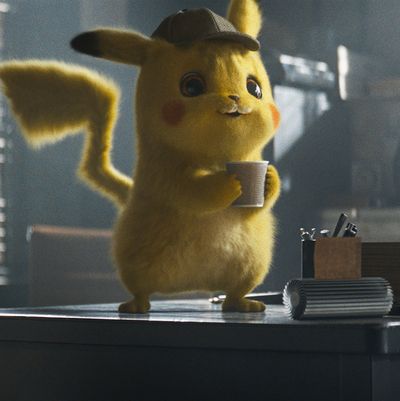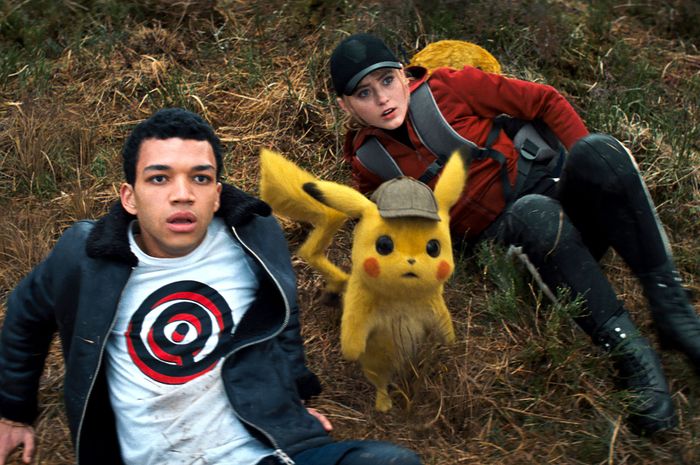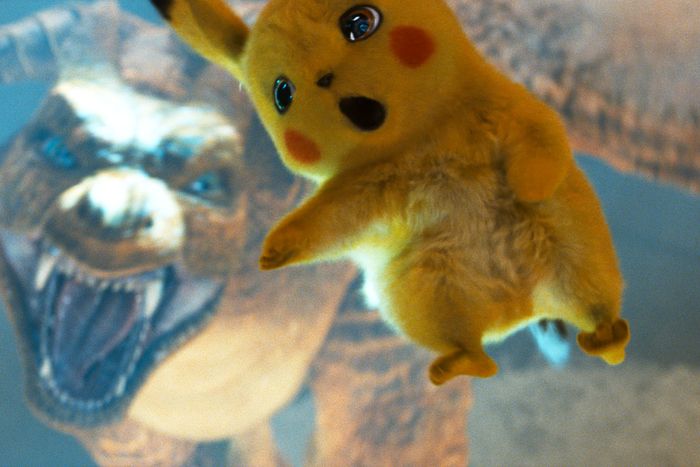
In 2012, Los Angeles-based film producer Cale Boyter cold-called the Pokémon Company and tried to set up a pitch meeting. His idea: a live-action movie dedicated to the video game/anime franchise filled with Pocket Monsters of varying and onomatopoeic names — Charizard, Bulbasaur, Wartortle. He and his two elementary school-aged sons had spent countless hours playing the trading card version of the game. That’s when Boyter had his epiphany. He should mount a non-cartoon, English-language version of the Japanese cultural export that’s maintained a two-decade stranglehold on American youth.
Boyter’s colleagues Mary Parent and Ali Mendes were on the call too, all three of them desperately trying to get through to the company’s Seattle office to sell their big idea. The American representatives who fielded the call were cordial but unhelpful. Hollywood producers, they told Boyter, Parent, and Mendes, were making live-action Pokémon overtures almost every day, and the Japanese media titan simply wasn’t interested. It was content churning out exclusively animated film fare — like 1999’s Pokémon: The Movie 2000.
According to two sources close to the production (who spoke to Vulture on condition of anonymity, as they were not authorized to publicly comment on the film), the dealmaking that followed that phone call would proceed in fits and starts until a movie that sounds as nonsensical as it was unlikely emerged. This was four years before any reports detailing negotiations for a live-action Pokémon movie surfaced — before the trio found themselves in Tsunekazu Ishihara’s office, signing an NDA and discussing a beta version of a video game starring a coffee-addicted Pikachu in a tiny Sherlock Holmes cap. It was five years before Ryan Reynolds came on board the project, and seven years before the eventual film hit theaters in Japan and then the U.S., where it’s expected to bring in between $50 million and $75 million over its opening weekend.
How did the filmmakers secure the rights to a live-action Pokémon movie seemingly no one else was able to get? They settled on the rights to a then-little known franchise spin-off instead: Pokémon: Detective Pikachu.
After that first phone call, Boyter had no idea the noir turns his tale was about to take. He and his team were scriptless and rejected when Parent — a former MGM powerhouse and co-vice chairperson of worldwide production at Universal Pictures, who was behind hit films like The Revenant, Godzilla and Kong: Skull Island — realized she knew the Pokémon Company’s general counsel, Don McGowan. She’d wanted to make a movie version of Halo back when he was a top lawyer at Microsoft; they were familiar enough, so he took her call. McGowan reiterated how many other movie industry machers had been trying to mount a live-action Poké-movie before arranging an in-person pitch meeting in Seattle. Parent scrambled to enlist a screenwriter (Derek Connolly) to draft a story in time — one that never, not even once, mentioned a detective.
After the meeting, the producers were informed that the Seattle office would have to coordinate with the Pokémon headquarters in Japan, and the real waiting game began. Between 2012 and 2016, Boyter, Mendes, and Parent badgered the Pokémon Company on a monthly basis in the hopes of acquiring their live-action film rights. At one point in early 2016, a deal at Paramount seemed nigh. Unfortunately, the “the timing wasn’t right.” From there, the producers’ frequent calls to the Pokémon Company — “harassment,” as one source described it to Vulture — slowed down to about one call every other month. (Executives at the Pokémon Company did not respond to Vulture’s request for comment.)
The live-action Poké-movie gained new momentum in March of 2016 — the year Pokémon Go launched in the U.S. — when Parent was hired as vice-chairman of worldwide production at Legendary Entertainment, a Chinese-owned media conglomerate responsible for Christopher Nolan’s Dark Knight Trilogy, The Hangover films, and the Monsterverse cinematic universe. Boyter and Mendes joined their boss at her new company; now they were freed from the constraints of trying to set up their project as independent producers. Around the same time, they discovered another ace up their sleeve.
In Japan, every animated Pokémon movie to date has been released by Toho — the company behind many of the country’s most beloved TV and film franchises, not least among them a certain Tokyo-thrashing megalizard. By luck, Parent had recently helped reboot the long-running franchise with 2014’s Godzilla, an international hit directed by Gareth Edwards and co-financed by Legendary. Executives at Toho vouched for her and Legendary, explaining to the Pokémon Company their ability to translate much-loved Japanese intellectual properties for a mainstream global audience. As a result, in the fall of 2016, the three producers flew to Tokyo to meet with Tsunekazu Ishihara, the Pokémon Company’s president and chief executive.
According to our sources, Ishihara listened to the group’s original pitch — which refrained from rehashing the typical Ash Ketchum-driven narrative, but still operated somewhere in the conventional Poké-verse — but he didn’t bite. Instead, he asked the producers to sign a non-disclosure agreement. What they saw next became the basis of their 2019 film: a character named Detective Pikachu that was in beta testing for a then unreleased video game for the Nintendo 3DS hand-held gaming system. The executive shared little more than a character biography, some preliminary storylines, and details on a few other creatures that inhabit the detective’s universe, but the producers instantly warmed to this version of the yellow lightning-generating rodent.
Within the Detective Pikachu milieu, beloved Pokémon could still exist (Snubbull, Psyduck, and Mewotwo all appear in the new film), and yet its version of Pikachu — whose sum total dialogue before that had consisted of a cheerful “Pika! Pika!” — felt completely new. Here he is a supersleuth who, despite suffering from amnesia, can speak in distinguishable words to a human companion. That companion is Tim Goodman, a 21-year-old whose familial connection compels him to start solving mysteries alongside the animonster. They travel through Ryme City, where a drug called “R” is wreaking havoc on the Pokémon population. The producers acknowledged that Ishihara’s approach to a live-action film, as absurd as it sounds, worked better than theirs.
From there, a deal between the Pokémon Company and Legendary (along with Warner Bros., who theatrically distributes all of Legendary’s movies in North America) was quickly struck. The Pokémon Company remained actively involved through every step of development: overseeing character design and story structure, ensuring the filmmakers colored within the lines. “They care so much about this, the attention to detail factored into every decision,” says Benji Samit, one of five credited screenwriters on Detective Pikachu.* “There were a lot of things that, when we wanted to do things different from the game, it would require running it up the flagpole — like a lot. They really care, even down to the species. They had opinions on the behaviors … ‘A Squirtle would behave like this and that’s completely different than a Gengar.’”
Legendary executives frequently traveled to Tokyo to get the company’s approval, while Pokémon executives flew to Hollywood to iron out production kinks. Translators worked overtime to bridge the English-Japanese divide. Within a year and a half of the agreement, Rob Letterman (Monsters vs. Aliens, Shark Tale) had been installed as director and Pokémon: Detective Pikachu was in production. Principal photography took place in Denver, Colorado and London, England. Attention to detail was important to everyone; the movie was even shot on actual 35 millimeter film, as opposed to digital video, in a bid to provide a neo-noir “natural grain,” appropriate for its detective subject matter.
Despite a fan petition to get Danny DeVito to voice the yellow protagonist, Ryan Reynolds handily bagged the leading role. The film’s PG-rated plot coalesces around his Pikachu — a caffeine-head with a memory problem à la Jason Bourne, who teams up with the son of his missing partner. Tim (Jurassic World: Fallen Kingdom co-star Justice Smith), as it turns out, is the only human capable of understanding Pikachu’s Poké-speak. Together (along with a reporter played by Kathryn Newton, and her Psyduck) they attempt to track down the elder Goodman.
In the end, were the years of “harassment” and development frustration worth it? So far Detective Pikachu is logging a decent 71 percent “fresh” on Rotten Tomatoes. “While video game movies haven’t had the best track record, this movie is by and far the best example of how to do one right,” opined IGN Movies. “Pokémon obsessives will want to check it out, but the movie is mostly an uninspired slog,” Bilge Ebiri wrote for Vulture, “not committed enough to work as a demented genre picture, and not funny enough to work as a goofy, lighthearted comedy.
Never having set out to create a Pokémon noir, Parent, Mendes, and Boyter wound up with something that is in all likelihood weirder and wackier than what diehard Poké-fans were expecting from a live-action movie. But given the early, overwhelmingly positive responses to Detective Pikachu — in contrast to the universal scorn being heaped on the first Sonic the Hedgehog trailer — the movie has a serious shot at becoming the first video game-based blockbuster. In that case, the producers may have played their battle right.
Jackson McHenry contributed additional reporting to this story.
*This article has been corrected to reflect the correct number of credited Detective Pikachu screenwriters.







